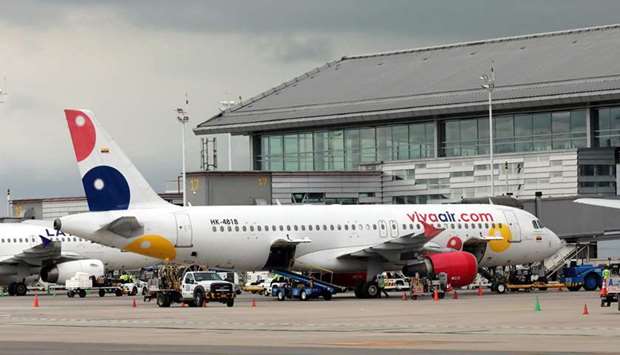Low-cost airline Viva Air Group is preparing to grow its network of routes and grab market share in Latin America as Avianca Holdings SA recedes after becoming the most prominent airline yet to go bankrupt as a result of the coronavirus pandemic.
Viva’s executive chairman Declan Ryan, who has helped found and operate a handful of low-cost carriers around the globe over decades including Ryanair Holdings Plc, said the pandemic poses the greatest threat to the industry he has seen.
But airlines with lower fixed costs and cheaper fares will come out ahead when demand picks back up as travellers stick to short flights and focus on price, he said.
“The lowest cost always wins. It’s really important at times like this because it reduces your cash burn,” he said in a phone interview. “We’ve had loads of crises, but this is the most severe because the ghost or enemy here is invisible.”
Travel bans across Latin America aimed at limiting the spread of coronavirus have shaken the air travel industry, leading investors to dump shares and bonds of the leading airlines, reducing air traffic to a trickle and causing Avianca, the region’s second-largest carrier, to file for Chapter 11 protection.
Globally, international travel is expected to take at least three years to rebound, according to the International Air Transport Association.
Yet, domestic travel may come back as soon as next year, according to the agency.
Closely held Viva has grounded its fleet — it operates 16 aircraft in Colombia and four in Peru — but has enough cash to last about a year, Ryan said. The company has put nearly two-thirds of its 975 employees on unpaid leave, and is negotiating with its suppliers.
It is unlikely to accept any new planes this year under its order for 50 Airbus A320s, Ryan said.
However, it has not called off aggressive expansion plans.
Viva is looking to add Ecuador as a destination and considering expanding its domestic network in Colombia and Peru and possibly adding more flights to Florida.
But Ryan said the crisis poses a huge unknown.
“This is a marathon, we’re a couple of kilometres into it, but how it will finally turn out, I’m not too sure,” said Ryan, the founder and managing partner of Viva owner Irelandia Aviation.
Bogota-based Avianca, which filed for Chapter 11 on May 10, is already reducing its presence in the region, pulling out of Peru and planning to reduce its fleet, according to court documents.
The company said in filings that low-cost carriers, including Viva, have been gaining momentum in recent years.
“Certainly, the situation with Avianca is an opportunity for us,” Ryan said. “About 80% of Avianca’s flights are short- to medium-haul and that’s the type of aircraft we operate.
I’m not saying all that market share is for us, I’m just saying that we’re capable of stepping up in whatever way we need to.”
The Colombian government, which grounded all flights in March, is likely to reopen domestic routes before it permits international travel.
Under an optimistic scenario, Viva’s demand will rebound in 12 months as travelers will be more comfortable on shorter-haul airlines focused on cleanliness, he said.
Viva plans to roll out a series of measures aimed at passenger safety, including distributing hand sanitising wipes, when flights do resume.
He called the idea of leaving the middle seat empty as a safety measure “nonsense” that would lead to higher fares.

Viva, which had eyed an initial public offering as early as next year, is likely to delay those plans until at least 2022, says executive chairman Declan Ryan.
